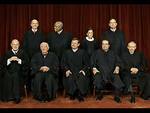Are Federal Judges Accountable? If So, to Whom?
 Are federal judges, especially Supreme Court Justices, accountable? If so, to whom? Accountability involves giving an accounting--an explanation, justification, or rationalization--of your conduct to someone who is entitled to the accounting. A decision-maker is accountable to her supervisor because she is required, in the appropriate circumstances, to provide the supervisor with such an account of her conduct. Accountability typically grants the supervisor the prerogative of disciplining the decision-maker for her errant decision. You have the capacity to discipline a subordinate when you can reverse the subordinate's decision, demote or fire the subordinate, or make sure the decision is given limited effect.
Are federal judges, especially Supreme Court Justices, accountable? If so, to whom? Accountability involves giving an accounting--an explanation, justification, or rationalization--of your conduct to someone who is entitled to the accounting. A decision-maker is accountable to her supervisor because she is required, in the appropriate circumstances, to provide the supervisor with such an account of her conduct. Accountability typically grants the supervisor the prerogative of disciplining the decision-maker for her errant decision. You have the capacity to discipline a subordinate when you can reverse the subordinate's decision, demote or fire the subordinate, or make sure the decision is given limited effect. The question of whether judges are accountable can then be understood as inquiring whether judges owe an explanation, justification, or rationalization of their decisions to anyone. Alternatively stated, are there any limits or constraints on judicial decision-making? There are, of course, informal limits or constraints on judges. First, federal judges typically must convince other judges to join their opinions in order for those opinions to control. Second, federal judges are often sensitive to public opinion and so are informally constrained by it. Third, federal judges often care about the legitimacy of the courts in the constitutional scheme and for that reason try not to become a loose canon, thereby detracting from the Court's prestige.
 Do these limits mean that judges are accountable? Not a chance! Because these concerns, even if highly regarded by judges, are not requirements imposed on judges, but instead are optional, they "constrain" judges only if judges have these concerns and not always even then. Nothing requires judges to be concerned about these matters; so if they are, it's due to a choice on their par, not a constraint on choice.
Do these limits mean that judges are accountable? Not a chance! Because these concerns, even if highly regarded by judges, are not requirements imposed on judges, but instead are optional, they "constrain" judges only if judges have these concerns and not always even then. Nothing requires judges to be concerned about these matters; so if they are, it's due to a choice on their par, not a constraint on choice.
Accountability needs to be stronger. It must be owed to someone. Accountability needs to be imposed on judges whether they share the relevant concerns or not. For example, one can argue that members of Congress are accountable to the electorate just because the electorate can remove them from office. Of course, in the real world, it's not always easy to do this. Nevertheless, the institutional design of Congress permits the electorate to discipline legislators. Nothing like this discipline applies to federal judges.
If judges are not accountable, at least in this republican democratic sense, are courts a "deviant institution" in American constitutionalism or is there some justification of their status? Constitutional theory is replete with attempted justifications. Some of the more prominent ones contend that judges:(1) protect minorities, (2) police the elected branches in order to guarantee allegiance to the Constitution, and (3) maintain objectivity through judicial independence and impartiality. However, these putative justifications overlook what happens when judges fail in these noble pursuits. In other words, who checks the checkers?
Mainstream constitutional jurists and scholars typically scoff at this problem. Instead, the role of unaccountable judges is regarded as one of the most beneficial features of American constitutionalism. Isn't it odd that a nation that takes credit for promoting democracy throughout the world, even boasting that the wave of democratization following the fall of the Soviet Union has the United States as its source, should embrace a governmental institutional whose connection to democracy--and the consent of the governed--seems attenuated at best?
unaccountable judges is regarded as one of the most beneficial features of American constitutionalism. Isn't it odd that a nation that takes credit for promoting democracy throughout the world, even boasting that the wave of democratization following the fall of the Soviet Union has the United States as its source, should embrace a governmental institutional whose connection to democracy--and the consent of the governed--seems attenuated at best?










0 Comments:
Post a Comment
<< Home